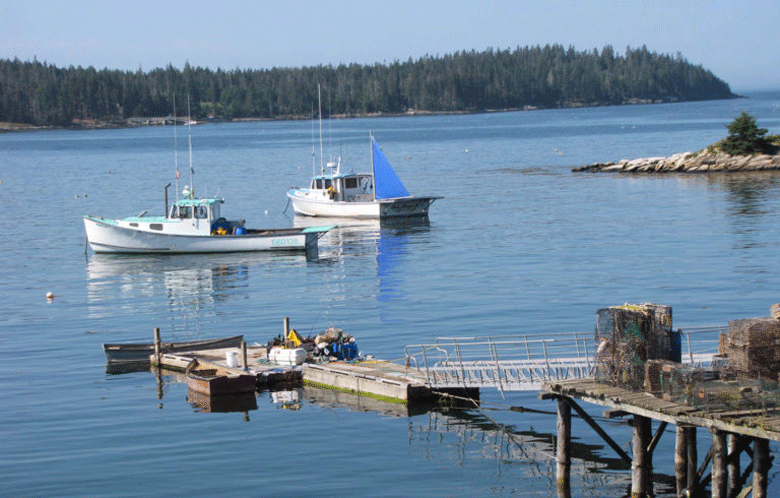Reflections is written by Island Institute Fellows, recent college grads who do community service work on Maine islands and in coastal communities through the Island Institute, publisher of The Working Waterfront.
The steamboat went away during World War II. Randy was five. Now, at 87 years old, he has more than a few stories to share.
The Island Institute Fellows program allows me and my colleagues to live and work in communities throughout Maine, gaining valuable personal and professional experience. Recently, the breadth of my work with the Swan’s Island Historical Society has expanded to include conducting oral history interviews.
One of my first interviews was with Randy. Going into our conversation, I knew his name, phone number, and that there was a picture in the archives of him playing a saxophone in 1951. Besides that, I didn’t know who was going to walk through the door or what we would talk about. I had to settle for my list of generic questions and a flicker of optimism that some of them would be relevant to his life.
We ended up talking for over three hours, with him sharing story after story and me hoping to form the right questions in time…
We ended up talking for over three hours that afternoon, with him sharing story after story and me hoping to form the right questions in time to keep him going. Randy had moved to Swan’s Island before he was old enough to remember anything prior to island life.
Over the course of the interview, I realized I knew much more about Randy than I thought, but I didn’t have enough details to connect him with island lore I had previously encountered. It felt like a strange déjà vu—I hadn’t heard the stories from his perspective, but somehow I knew what was going to happen next. Only at the end of these stories did I have enough information to put two and two together.
His uncle? The man grinning and holding an accordion in almost every photo of him I come across. The same man who used an oxen and a horse to harvest hay. “To team an oxen with a horse was unheard of,” Randy said.
His grandmother? The tenacious woman who always brought her violin with her to church and valued her self-sufficiency.
Randy elaborated: “At 80 she was tired of being penned up so she bought herself a motor scooter.” The kick starter gave her trouble, but she did manage to make it from one side of the island to the other to visit her daughter.

It’s an intimate experience—a stranger sharing his life with me as if I were a family member or friend. People put an incredible amount of trust in me to preserve and protect their stories when they agree to sit down and be interviewed.
They don’t know me well. They’ve got things to do. But they make the time and take the chance.
We delve into the good times and bad times life has sent their way. Sometimes there are moments where I don’t feel like I’m in an interview anymore.
Recalling the past has brought the interviewee to an entirely different place in time, and because I’m sitting across from them, they’re forced to take me with them with whatever tools they can muster, details they might remember—the Day Glo colors of their father’s buoys, the pungent smell of duck boiling on their grandmother’s stove, the static drone of a CB radio that never gets shut off. They stare off somewhere distant and I hang on every word.
These opportunities to sit down with people and record island history in an islander’s own words and voice are invaluable.
While I savor time spent working alone with the archives, piecing together plotlines from old records and family albums, nothing compares to hearing firsthand accounts of how events unfolded, what life was like at a given moment in time.
The history a photo holds is finite, but a person can answer questions, share details that don’t exist outside of their memories.
Olivia Jolley works with the Swan’s Island Historical Society. Born in North Carolina, she grew up on the coast of Southern California and moved to Maine to attend College of the Atlantic.





